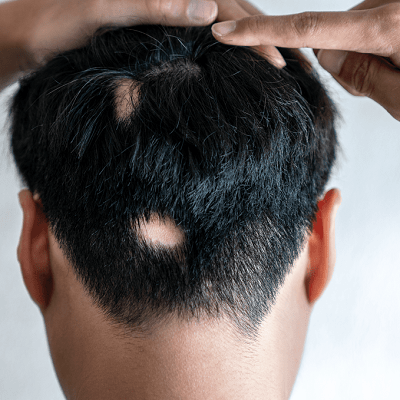Is Alopecia Areata Treatment Right for Everyone?
Alopecia areata is a complex autoimmune disorder causing hair loss in small, round patches and, in more severe cases, extensive hair loss on the scalp and body. Although treatments are available, not every approach may suit all individuals, as the condition and response to treatment vary widely. Determining if alopecia areata treatment is right for you involves several factors. Let's Explore Alopecia Areata Treatment in Dubai.
Understanding Your Alopecia Areata Type
Alopecia areata comes in different forms, which can influence the suitability and effectiveness of treatment:
- Patchy Alopecia Areata: Small patches of hair loss may respond well to targeted treatments like corticosteroid injections, topical steroids, or other localized therapies.
- Alopecia Totalis: This type involves complete scalp hair loss, often requiring more extensive treatments, such as topical immunotherapy or oral medications, which may be more effective but have broader side effects.
- Alopecia Universalis: Total hair loss on the body, including eyebrows and eyelashes, is more challenging to treat and may require a combination of systemic therapies.
Knowing your alopecia type helps in setting realistic expectations and choosing the most appropriate treatment options.

Treatment Options and Individual Suitability
Alopecia areata treatments range from topical solutions to advanced oral medications. Here’s a look at various treatments and their suitability:
Topical Corticosteroids: These are generally safe for individuals with mild hair loss, though they may not be as effective for extensive cases. They are often well-tolerated but may cause skin thinning with prolonged use.
Corticosteroid Injections: Local injections are ideal for small patches of hair loss, but repeated injections can cause discomfort and may not be suitable for widespread alopecia.
Topical Immunotherapy: Effective for individuals with more extensive alopecia, but it can cause scalp irritation and requires regular applications and monitoring.
JAK Inhibitors: These newer medications are promising but are mainly recommended for moderate to severe cases due to potential side effects, including immune suppression and liver function alterations. They’re generally prescribed to those who haven't responded to other treatments.
Choosing a treatment involves balancing effectiveness with potential side effects, making it crucial to consult a dermatologist who can guide you on the safest option.
Considering Overall Health and Medical History
Not all treatments are safe for everyone, especially those with certain health conditions:
Autoimmune Diseases: Since alopecia areata is itself an autoimmune disorder, individuals with other autoimmune conditions should be cautious. Certain treatments, like immunosuppressive drugs, may increase the risk of complications.
Preexisting Conditions: Individuals with liver disease, immune disorders, or certain allergies may be advised against systemic treatments such as JAK inhibitors or corticosteroids, which can interfere with their health.
Age and Pregnancy: Certain medications are not recommended for young children, pregnant individuals, or those breastfeeding. It’s essential to inform your doctor of any medical conditions or family planning considerations.
Assessing Treatment Goals and Expectations
Alopecia areata treatment doesn’t offer guaranteed, permanent regrowth. Hair loss may recur, and the results of treatment can vary widely. Therefore, individuals considering treatment should have realistic goals:
Understanding Limitations: Some people may experience partial regrowth, while others may see full regrowth that still requires maintenance treatments to prevent recurrence.
Evaluating Commitment: Treatments like immunotherapy or injections often require regular sessions. Deciding whether you can commit to the time and potential discomfort associated with certain options is essential.
Potential Side Effects and Tolerance
Each alopecia areata treatment comes with specific side effects, which can impact whether the treatment is suitable for you:
- Local Side Effects: Topical treatments and injections may cause mild irritation, scalp redness, or sensitivity.
- Systemic Side Effects: Oral medications and immunotherapy can lead to broader effects, including immune suppression, liver issues, or allergic reactions.
Some people find the side effects too disruptive, especially if they outweigh the benefits of hair regrowth. Your dermatologist will discuss these risks in detail to help you make an informed choice.
Psychological and Emotional Considerations
Alopecia areata can be challenging on a personal and emotional level, and it’s essential to consider the psychological impact of undergoing treatment:
Stress and Anxiety: For some, the anticipation of treatment and its potential side effects can be stressful. Additionally, hair regrowth can be unpredictable, leading to heightened anxiety.
Emotional Support: Counseling or joining support groups can be beneficial if the condition or treatment impacts your mental well-being. Therapy or peer support can help build resilience and provide emotional coping strategies.
Alternative and Non-Treatment Options
Some individuals opt to embrace their hair loss rather than pursue medical treatment, focusing instead on self-care and emotional well-being:
- Cosmetic Solutions: Wigs, scarves, and makeup for the eyebrows or eyelashes offer non-invasive options to cope with hair loss.
- Holistic and Lifestyle Adjustments: While not a cure, incorporating stress management practices, a nutrient-rich diet, and a supportive community can positively impact overall wellness.
These non-medical strategies provide a sense of control and confidence, especially for those who may not find medical treatment suitable.
Conclusion
Not everyone with alopecia areata will pursue or respond well to treatment, as individual suitability depends on multiple factors, including the type and extent of hair loss, personal health considerations, tolerance for side effects, and emotional readiness. Consulting with a dermatologist will help determine the best path for your specific case. For some, alopecia areata treatment can offer promising results, while others may find peace in exploring alternative ways to manage and embrace their condition.